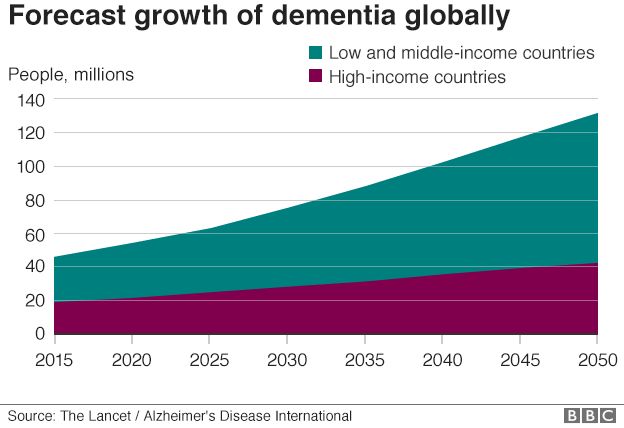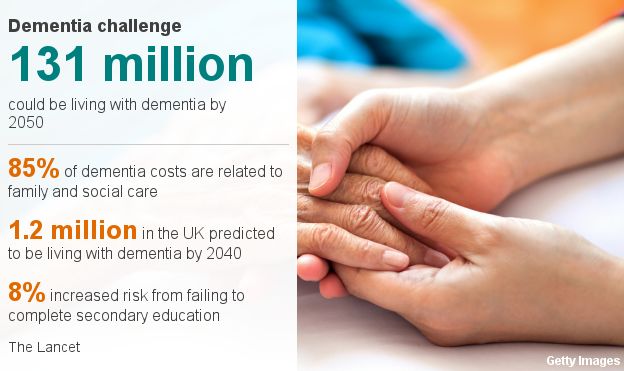- 20 July 2017
- From the sectionHealth
-
(건강) 치매를 줄이는 9가지 생활습관: 치매 中 3분의1 예방 가능아름다운 인생/건강 2017. 7. 25. 20:59
출처: http://www.bbc.com/news/health-40655566
Nine lifestyle changes can reduce dementia risk, study says
Want to avoid dementia? This might help
**밝은 하늘: 현재 영국에는 치매환자가 85만명 있다. 작년 영국 인구는 65.64 million이므로 6,500만명인 셈이니, 결국 영국의 치매환자는 대략 650명 중에 8.5명인 셈이다. 한국은 edaily의 기사에 의하면, 치매환자가 2015년 기준 648,000명이다. 2016년 기준 한국인구는 51.25 million이므로, 5,125만명인 셈이니, 결국 한국의 치매환자는 대략 512명 중에 6.5명인 셈이다.
One in three cases of dementia could be prevented if more people looked after their brain health throughout life, according to an international study in the Lancet.
It lists nine key risk factors including lack of education, hearing loss, smoking and physical inactivity. (hearing loss: 청력상실) (physical inactivity: 신체활동부족)
The study is being presented at the Alzheimer's Association International Conference in London.
By 2050, 131 million people could be living with dementia globally. 2050년1억3천 1백만명이 치매를 앓게 될 것으로 보인다.
There are estimated to be 47 million people with the condition at the moment. 현재 지구상에 4천7백만명이 치매를앓고 있는 것으로 추정된다.
Nine factors that contribute to the risk of dementia **치매를 초해하는 9가지 요소
- Mid-life hearing loss - responsible for 9% of the risk (1) 청력상실 - 치매의 9%
- Failing to complete secondary education - 8% (2) 중등교육 미달 - 치매의 8%
- Smoking - 5% (3) 흡연 - 치매의 5%
- Failing to seek early treatment for depression - 4% (4) 우울증의 조기치료 실패 - 4%
- Physical inactivity - 3% (5) 신체활동부족 - 3%
- Social isolation - 2% (6) 사회적 고립 - 2%
- High blood pressure - 2% (7) 고혈압 - 2%
- Obesity - 1% (8) 비만 - 1%
- Type 2 diabetes - 1% (9) 제2형 당뇨 - 1%
These risk factors - which are described as potentially modifiable - add up to 35%. The other 65% of dementia risk is thought to be potentially non-modifiable.
Source: Lancet Commission on dementia prevention, intervention and care
"Although dementia is diagnosed in later life, the brain changes usually begin to develop years before," said lead author Prof Gill Livingston, from University College London.
"Acting now will vastly improve life for people with dementia and their families and, in doing so, will transform the future of society."
The report, which combines the work of 24 international experts, says lifestyle factors can play a major role in increasing or reducing an individual's dementia risk.
It examines the benefits of building a "cognitive reserve", which means strengthening the brain's networks so it can continue to function in later life despite damage.

Eve Laird is taking part in a study on how to prevent dementia Eve Laird, from Dumfries, is worried about dementia because her mum is living with the condition.
She has decided to make some changes to her lifestyle.
"I'm terrible for eating processed foods and takeaways and I've really been trying to cut back on that. (processed food: 가공식품) (takeaway: 테이크아웃 음식점 혹은 이런 음식)
"I definitely drink a lot more water than I used to - and I don't drink as much coffee now.
"I actually took part in the Edinburgh marathon. For that I joined the Dumfries running club - I go there once a week."
She says she felt so much better for the exercise, and for improving her diet.
"I felt a lot healthier and mentally sharper as well. It's something I'd really like to continue, but it is hard to stay on track."
"I just think the small changes can make such a big difference."

Failure to complete secondary education was a major risk factor, and the authors suggest that individuals who continue to learn throughout life are likely to build additional brain reserves.
Another major risk factor is hearing loss in middle age - the researchers say this can deny people a cognitively rich environment and lead to social isolation and depression, which are among other potentially modifiable risk factors for dementia.
Another key message from the report is that what is good for the heart is good for the brain.
'Positive changes'
Not smoking, doing exercise, keeping a healthy weight, treating high blood pressure and diabetes can all reduce the risk of dementia, as well as cardiovascular disease, and cancer.
The researchers say they did not have enough data to include dietary factors or alcohol in their calculations but believe both could be important.

Dr Doug Brown, director of research at Alzheimer's Society, said: "Though it's not inevitable, dementia is currently set to be the 21st Century's biggest killer. We all need to be aware of the risks and start making positive lifestyle changes."
Dr David Reynolds, chief scientific officer at Alzheimer's Research UK, said: "Alongside prevention research, we must continue to invest in research to find a life-changing treatment for people with this devastating condition."
'아름다운 인생 > 건강' 카테고리의 다른 글
(건강) WHO는 공식적으로 게임중독을 "게임장애"로 분류 (0) 2018.01.05 (건강) 인도에서 사용한 생리대를 수거하는 이유 (0) 2017.09.09 (건강) 영국 10년 실내금연 정책 시행 후 달라진 점들 (0) 2017.07.01 (건강) 오래 살고 싶으면 과일과 야채를 매일 10인분 먹어라 (0) 2017.02.25 (건강) Pubic hair grooming 'STI risk linked to skin tears' (0) 2016.12.06
